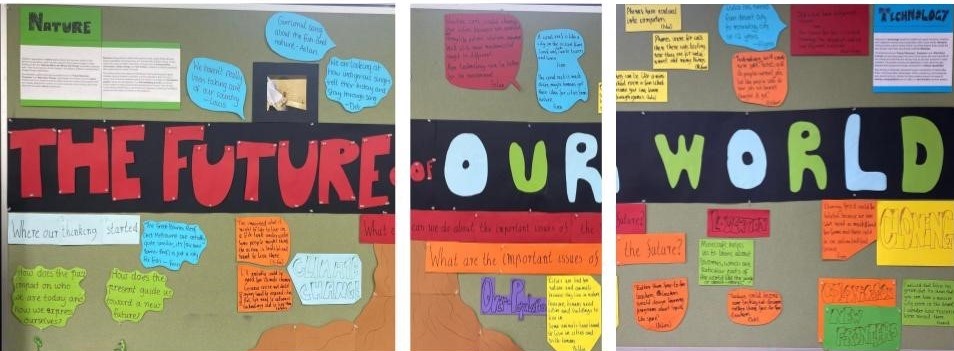The future continues to provide an invigorating context for inquiry that provokes children’s ethical capabilities through problem-solving and imagination. We have established a rich question for our research project- What can we do about the important issues of the future? This question will continue to guide our inquiry as children expand their thinking, and later when they apply their thinking in a meaningful way. Over recent weeks, this question has been broken down and our documentation analysis has focussed on discovering children’s thoughts about ‘What are the important issues of the future?’. We have also begun to discover insights into our next subquestion, ‘What do we think about the important issues of the future?’ This demonstrates the ever-evolving nature of collective inquiry.
“I like thinking about the future because it is so open-ended, anything could happen and it really helps my chain of thinking”. -Rohan
Our documentation shows that nature and technology are the two influences that are apparent in children’s thinking about issues of the future. Furthermore, the issues that children are most connected to are overpopulation, education, colonisation and new frontiers, climate change, and cloning.
Technology
Advances in technology excite the children and spark innovative, inventive and imaginative thinking about possibilities within future worlds. Provocations such as ‘Future Dilemmas’, ‘Evolution’ and ‘Alternative Futures’ provide insight into which future issues are most important to the children and what they value most as part of their solutions to future problems. The problem solving and deliberation of such dilemmas also deepens their perspective through the development of ethical capabilities.
“I like trying to solve the problems of the future. There are lots of possibilities”-Finn
New thinking is continually provoked through consideration of before-after, if-then, and cause-effect relationships. When considering a technologically ever-advancing future, children find that problems around the issues of cloning, overpopulation and our effect on new frontiers are ever-present.
“Dubai has grown a lot. It shows that you can have a massive city even in the desert. It has turned from desert city to technology city in 12 years.” -Flynn
“Old cities have different colours.” (Finn) “One reason for this is because technology has advanced and we have different materials.” (Alice)
“Cloning food could be helpful because we wouldn’t need as much land for farms and there could be an unlimited food source.” -Finn
“Electric cars could be better for the future environment but they need to get cheaper so more people can afford it” -Frankie
Recently, children have also become interested in how technology may influence their daily lives, which has bought the future of education into their thinking. This recently discovered issue could raise broader thinking about to role of human connection and occupations of the future.
“Phones have evolved into computers.” (Isla) “Phones were for calls, then there was texting. Now they are for entertainment and many things.” (Rohan) “They can be like a mini-school even a fun school because you can learn through games.” (Lulu)
“Teachers could become more like technological designers rather than face-to-face teachers.” -Seb
“Technology will create new jobs. Robots will do people’s current jobs, but the people will do new jobs we haven’t thought of yet.” -Esther
Nature
Children’s appreciation of nature seems inherent and has been evident in their informal conversations, which naturally sparked thinking about changes in nature. Building on this, the ‘Noticing Nature and Measuring Change’ provocation ongoingly asks, “How do we measure natural changes”, and deepens children’s understanding of change through mathematics.

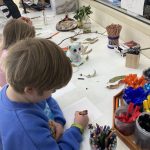

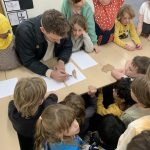
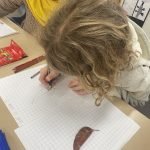
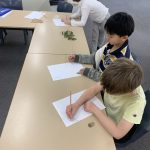
Documentation gathered through provocations such as ‘Future Dilemmas’, ‘Evolution’ and ‘Alternative Futures’ demonstrates the children’s care for nature. Problem-solving in imagined futuristic worlds commonly involves finding solutions that are mutually beneficial for humans and nature, and even more commonly leads to moral dilemmas that spark ethical consideration. As they explore the cause and effect relationships of issues such as overpopulation, colonisation, climate change, and new frontiers, preservation of nature is prioritised, often superseding the needs of humans.
“Some of the big decisions of the future are whether to smash down buildings and build more gardens or the other way around.” -Aaliyah
“Maybe we should have to plant a tree every time one is cut down.” -Elliot
“Cities are bad for nature and animals because they live in nature. However, humans need cities and buildings to live in. Some animals have learnt to live in cities with humans.” -Billie
“Underwater cities are like taking over a new place we would create pollution down there”- Alice
The children believe that neglect and devaluing of nature are among the biggest mistakes made by Australia’s colonisers, and are motivated to learn from this. A shared value of land and waterways enhances children’s connection to First Nations peoples’ stories and perspectives. The ‘Acknowledging Country’ provocation invites children to create personal Acknowledgements of Country. Many of these include strong commitments to care for land and waterways, positioning First Nations peoples as role models and leaders in this endeavour.
Collectively the children developed the definitions below-
Acknowledge- “to express respect and thanks for what we know is true and learn from it.”
Reconcile- “acknowledging wrongs of the past and agreeing on how to work towards a better future.”
“We haven’t really been taking care of our country.” -Louis
“I’m painting ways to look after the environment at school; composting and recycling more. So we can look after the earth like the Woiwurrung people.” -Sienna
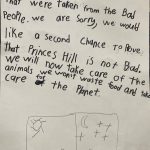

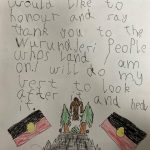
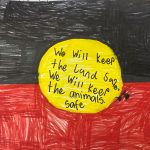


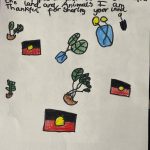

The upcoming weeks involve narrowing our focus issues so that we can expand our thinking further, forming justified, defensible and articulated thinking about them. From there the work turns to the development of projects that surmise, demonstrate and apply our collective thinking in a meaningful way that makes a difference to the community.
